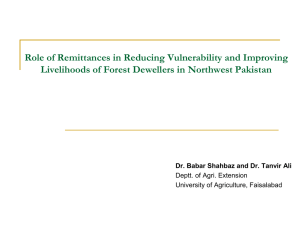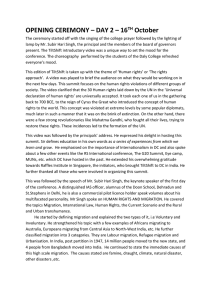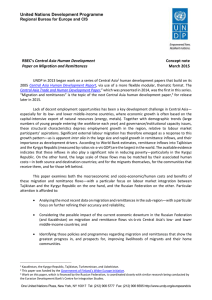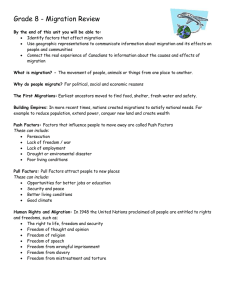EMBARGO: 6 November 12:30 CET
advertisement
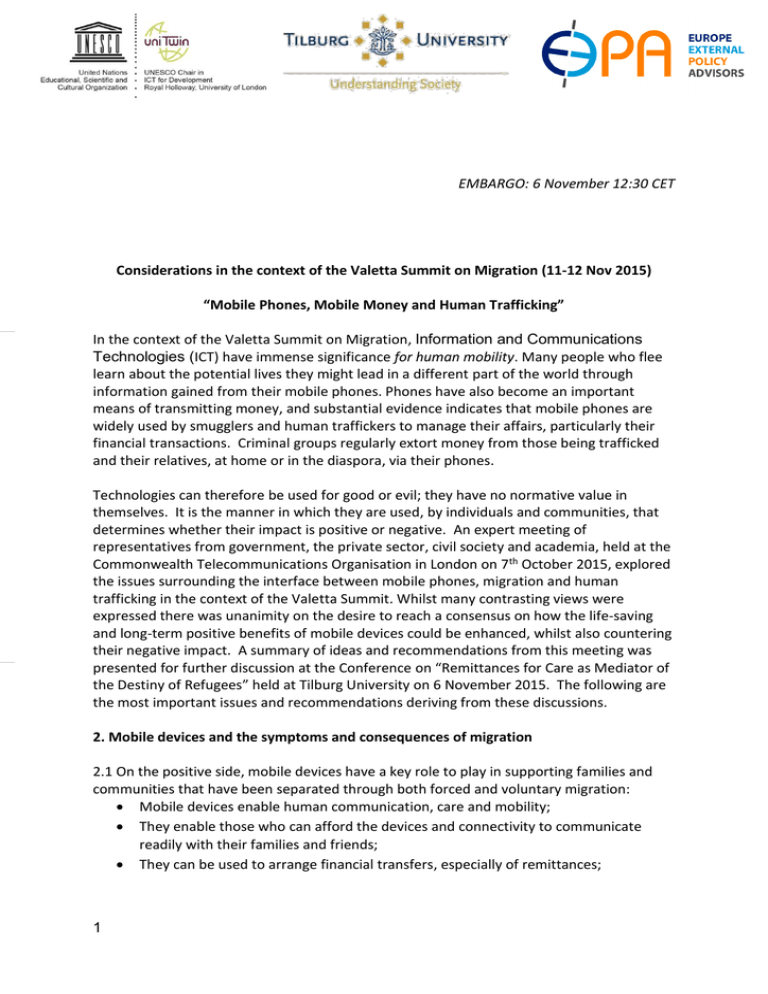
EMBARGO: 6 November 12:30 CET Considerations in the context of the Valetta Summit on Migration (11-12 Nov 2015) “Mobile Phones, Mobile Money and Human Trafficking” In the context of the Valetta Summit on Migration, Information and Communications Technologies (ICT) have immense significance for human mobility. Many people who flee learn about the potential lives they might lead in a different part of the world through information gained from their mobile phones. Phones have also become an important means of transmitting money, and substantial evidence indicates that mobile phones are widely used by smugglers and human traffickers to manage their affairs, particularly their financial transactions. Criminal groups regularly extort money from those being trafficked and their relatives, at home or in the diaspora, via their phones. Technologies can therefore be used for good or evil; they have no normative value in themselves. It is the manner in which they are used, by individuals and communities, that determines whether their impact is positive or negative. An expert meeting of representatives from government, the private sector, civil society and academia, held at the Commonwealth Telecommunications Organisation in London on 7th October 2015, explored the issues surrounding the interface between mobile phones, migration and human trafficking in the context of the Valetta Summit. Whilst many contrasting views were expressed there was unanimity on the desire to reach a consensus on how the life-saving and long-term positive benefits of mobile devices could be enhanced, whilst also countering their negative impact. A summary of ideas and recommendations from this meeting was presented for further discussion at the Conference on “Remittances for Care as Mediator of the Destiny of Refugees” held at Tilburg University on 6 November 2015. The following are the most important issues and recommendations deriving from these discussions. 2. Mobile devices and the symptoms and consequences of migration 2.1 On the positive side, mobile devices have a key role to play in supporting families and communities that have been separated through both forced and voluntary migration: Mobile devices enable human communication, care and mobility; They enable those who can afford the devices and connectivity to communicate readily with their families and friends; They can be used to arrange financial transfers, especially of remittances; 1 Mapping applications can be used to enable people to know where they are, and to travel to new locations; and They can be used to save lives of those in emergency situations and at sea. 2.2 ICTs are also used by criminal organisations involved in smuggling and human trafficking: To arrange financial transfers; To demand ransoms from family members by torturing people being trafficked whilst they are on the phone to their relatives; and As a means of generating additional income through other illegal activities. 2.3 In the context of the Valetta Summit’s objectives to enhance cooperation on legal migration and mobility, we therefore recommend that: Means should be identified through which the cost of transferring remittances can be reduced; New business models should be identified through which international and bilateral agencies might assist in reducing the costs of remittances and communications; and The use of corporate social responsibility initiatives of global telecommunications corporations to achieve these goals should be encouraged. 2.4 In the context of the Valetta Summit’s objectives to enhance international protection and asylum, focusing particularly on unaccompanied minors and women, we recommend that: Existing expertise on the use of digital technologies in refugee camps is drawn upon to identify ways in which relevant educational and training materials can be made available to migrants; New initiatives are funded explicitly to provide mobile-based resources to support unaccompanied minors and women; and Means of enhancing the protection of vulnerable refugees, especially women, unaccompanied minors and people with disabilities, through the use of mobile devices should be developed. 2.5 In the context of the Valetta Summit’s objectives to prevent and fight against migrant smuggling and trafficking of human beings, we recommend that: Additional resources should be made available, and agreements reached, to enable crime prevention agencies and mobile telephone operators to work more effectively together to trace and interdict those using mobile devices for criminal activities relating to smuggling, trafficking and illegal financial transactions; This work should draw on human rights law and protocols and international agreements, and on a bilateral basis between individual African countries and European institutions, fully respecting the obligation of International Law to protect refugees; 2 2 Further research should be funded to examine the extent of, and the precise ways through which, mobile devices are used illegally to support smuggling and trafficking of people from Africa to Europe; and Initiatives are developed to provide relevant information to potential migrants through mobile devices about the dangers and realities of the migration experience, explaining how they can protect themselves, with the aim of reducing the risk that these people fall prey to illegal smugglers and human traffickers. 3. Mobile devices and the causes of migration 3.1 Digital technologies, especially mobile devices, provide people with far greater access to the world’s information and expertise. They can reduce the sense of exclusion and alienation from current trends and realities. Digital devices are also a means through which poverty can be reduced and employment generated, and thereby enhance development in countries from which migrants leave. They can provide the means through which families communicate and take responsibility for family members. 3.2 In the context of the Valetta Summit’s objectives to maximise development benefits of migration, we recommend that governments, together with international and bilateral agencies, should: Encourage the widespread use of simpler and less expensive mobile devices where relevant; Provide sustained support to the poorest countries and people so as to achieve universal and affordable access to mobile broadband and satellite connectivity; Ensure that direct communication is facilitated between neighbouring countries; Put in place systems to facilitate and enhance the use of mobile devices to enable more efficient transfer of remittances, noting that remittances are an important sources of income for the social and economic development of poor people, and in line with 2.3 above; and Share existing good practices more widely between governments and civil society movements, such as the use of mobile devices to enhance democracy, through the provision of relevant information relating to governance and elections, as well as innovative means of collective decision making. 3.3 In the context of the Valetta Summit’s objectives to address instability and crisis, we recommend that: Resources are made available to share good practices in the use of mobile devices for reducing instability, such as those resulting from “natural” disasters, more widely in relevant countries; and 3 3 Additional funding for innovation, both research- and practice-led, into ways in which mobile devices can be used to reduce social and political instability should be included as priorities in future European research funding programmes. 3.4 In the context of the Valetta Summit’s objectives to address causes of migration, we recommend that resources are made available to support the many refugees in camps in Africa making use of the various capacities of mobile devices to provide dignified livelihoods, and specifically to: Provide primary, secondary and tertiary education as well as wider cultural activities, assisted by ICT; Support quality diagnosis, services and health support systems and strengthen community health care in rural and refugee communities; Support Small and Medium Sized Enterprises, livelihood development and training of youth in ICT; and Provide additional funding for innovation, both research- and practice-led, into ways through which mobile devices can be used to reduce social and political instability in future European research funding programmes with African partnerships. 3.4 The meetings also expressed strongly the need that all bilateral aid and all aid in general should be provided in full transparency and accountability of all public finance, and that the essential clauses to respect human rights, the rule of law and democratic institutions are in place, including public finance systems. The basic principles should be fully respected and promoted in the context of any assistance including aid to help curb migration. 3.5 The meetings emphasised unconditionally and unreservedly the obligation for all parties to protect all refugees and asylum seekers in accordance with international law. Prof Dr. Mirjam van Reisen, International Relations, Innovation and Care, Tilburg University Prof. Dr. Tim Unwin, Unesco Chair in ICTs for Development. (ICT4D), Royal Holloway, University of London Tilburg/London, 6 November 2015 4 4
